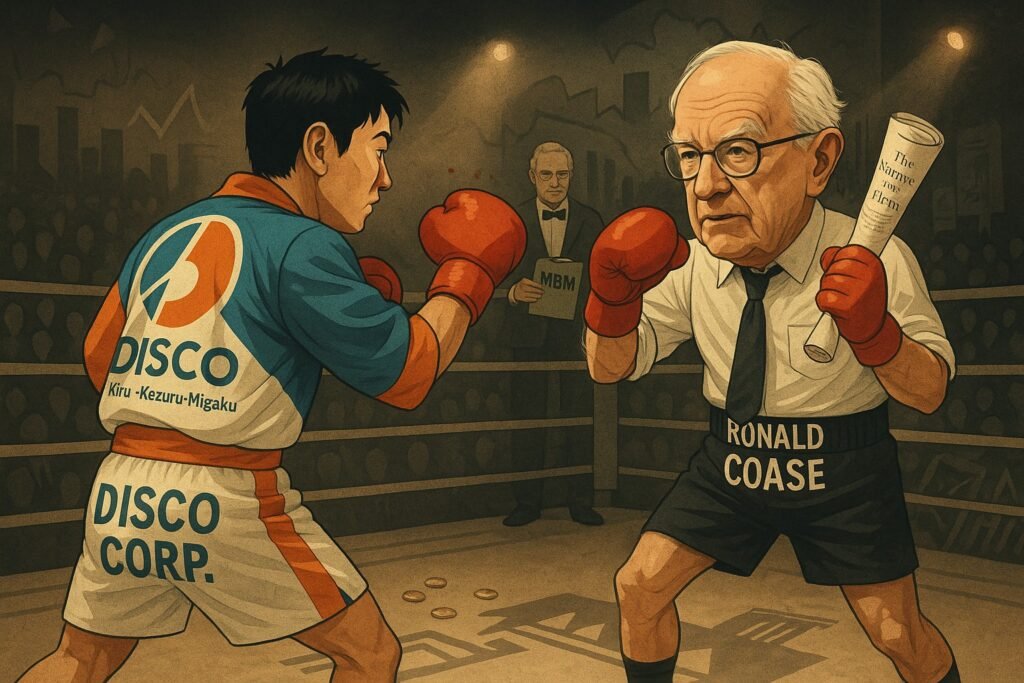For more than two decades, Disco Corp., a Japanese company with $25 billion in annual sales, has been trying to operate as if its 7,000 employees were independent contractors in the open market. The 87-year-old company now manufactures three-fourths of all the machines to cut, grind, and dice semiconductors. An interesting story in the Financial Times (Harry Dempsey and David Keohane, “Can You Run a Company as a Perfect Free Market? Inside Disco Corp,” Financial Times, May 1, 2025) reports:
Since 2011, [Disco] has conducted a radical experiment to operate a blue-chip company on purely free-market principles. Nobody has a boss. Superiors cannot tell juniors what to do. Each day, employees choose whatever tasks they want. They can quit or join a different team at their own volition.
Within this state of perfect freedom, most of their decisions will be guided by Will, as Disco’s internal currency is known. Employees earn Will by doing tasks. They barter and compete at auction with their colleagues for the right to do those tasks. They are fined Will for actions that might cost the company, or compromise their productivity. Their Will balance determines the size of their bonus paid every three months. …
His door, [the CEO] says, is open to even the most junior Disco employees, as long as they are willing to pay 165,000 Will for 30 minutes of face time with the top boss.
The Will money supply is generated by sales and filters down the company through exchanges and auctions where individuals who need tasks done (demand) and those who volunteer to do them (supply) determine their prices. Anybody can offer to pay for a task he needs done. If a sales team wants a new machine to be manufactured or tweaked, it only needs to offer the manufacturing team enough Will to make the project profitable for the latter. An IT system (operating software) manages the auctions and transfers.
Not everything within Disco is pure market, though. Only 40% of employees’ bonuses depend on their Will balance. The human resources department has a monopoly on recruitment. The CEO, like a central bank, can create Will at will (if you allow me the easy pun) for special projects. “He casts himself as a benevolent autocrat,” says the Financial Times. There is no currency market for the Will, which is not really money. The company looks more like a “village community” than a free and often impersonal market. In many ways, then, the supposed market participants are only employees. More surprisingly, Disco’s website gives the impression of a very ordinary corporation, with a social mission, CSR, stakeholders, and all that…
The distinction between the firm and the market is easy to understand for someone who has read Ronald Coase’s seminal article “The Nature of the Firm” (Economica, 1937). It is difficult to get very excited about the idea of “running” a firm like a market. Why does the hierarchical firm exist within the free market? Coase asked. He argued that the raison d’être of the firm is to avoid the transaction costs of using the market, that is, the costs of finding subcontractors (instead of hiring employees), discovering relevant prices, negotiating and signing multiple contracts for every project, and trying to forecast all related market conditions. When circumstances are such that these transaction costs are or become higher than the cost of organizing and managing a firm, the entrepreneur or his investors will choose the latter.
Charles Koch and his late brother David have, for several decades, run a similarly inspired but less all-encompassing system called “Market-Based Management” (MBM). Their company, Koch Industries, is the largest non-listed corporation in America. It has grown rapidly. More mundanely, many corporations use market-like incentives, including some internal competition, in their management or structure. Disco Corp. has gone much further in the experiment.
Whether a firm is a hierarchical-authoritarian organization or a free-market microcosm is a matter of degree. On the one hand, every firm in a free society contains market features, if only the freedom of employees to leave and the absence of physical coercion. On the other hand, a one-person business often establishes long-term relations with some contractors or suppliers. Diversity, entrepreneurship, and innovation—all features of free markets—generate information about the best corporate formulas in different circumstances. But Coase’s insight still seems inescapable, and Disco Corp. must be an experiment at the limit of the possible. The dream of literally transforming a firm into a market looks as unrealistic (albeit not dangerous) as the collectivist utopia of replacing the market with an organization.
One irreplaceable advantage of a free-market economy is free enterprise and experimentation at the micro level. The free market is the abstract locus within which voluntary organizations operate.
******************************

Disco Corp. and Ronald Coase, an exaggerated view, by Chat GPT (and Pierre Lemieux)
